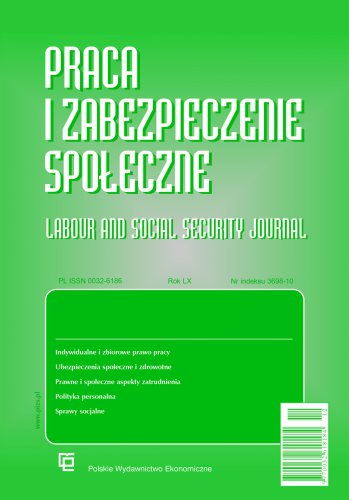The "social organisation" of the workplace as a fundamental concept of labour law theory
The workplace must be recognised as a key institution in the theory of labour law and this is beyond any doubt. The social consequences of failing to recognise the workplace can be dramatic. Moreover, in a situation where other human communities are scarce, the importance of the community of the workplace (especially if we remember about its relative stability) turns out to be fundamental. Thus, the importance of the community of the workplace is crucial not only for the individual, but also for the society. Since public tasks and public functions exist in labour law, and the workplace exists as a subject and the manager of the workplace exists as a governing body, this forces us to reflect upon the legal qualification of the workplace and its manager. As mentioned above, the need to build on this reflection turns out to be urgent in today's scholarship if we take into account the social dimension of the workplace as a community. Thus, there is an absolute necessity to determine the legal relations between the employee and the workplace, but also (or perhaps especially) between the workplace and the state. This is especially important today, when the workplace turns out to be almost the only significant instrument in the administration of the state with regard to entities which exist outside of strictly defined public administration. The construction of the workplace vests the state with enormous possibilities for organising and shaping the society.
References
Reference/Bibliografia
Boć, J. (2007). Prawo administracyjne. Warszawa.
Czerniak-Swędzioł, J. (2017). Prawo pracy w ujęciu heterogenicznym. In K. W. Baran (Ed.), System prawa pracy. Tom I. Część ogólna. Warszawa.
Lang, J. (2006). In M. Wierzbowski (Ed.), Prawo administracyjne. Warszawa.
Lipowicz, I. (2000). In Z. Niewiadomski (Ed.), Prawo administracyjne. Cześć ogólna. Warszawa.
Mitrus, L. (2017). In K. W. Baran (Ed.), System prawa pracy. Tom I. Powstanie i ewolucja prawa pracy. Warszawa.
Mounk, Y. (2019). Lud kontra demokracja. Dlaczego nasza wolność jest w niebezpieczeństwie i jak ją ocalić. Warszawa.
Musiała, A. (2020). O atrakcyjności aksjologii prawa administracyjnego dla prawa pracy i tego konsekwencjach. Przegląd Legislacyjny, 107(3), 2–21.
Musiała, A. (2021). O fundamentalności przepisów bezwzględnie wiążących w prawie pracy. Monitor Prawa Pracy, (3), 10–14.
Niewiadomski, Z. (2015). Instytucje prawa administracyjnego. In R. Hauser, Z. Niewiadomski & A. Wróbel (Eds.), System prawa administracyjnego. Tom 1. Warszawa.
Sobczyk, A. (2013a). Prawo pracy w świetle Konstytucji RP. Tom I. Teoria publicznego i prywatnego indywidualnego prawa pracy. Warszawa.
Sobczyk, A. (2013b). Prawo pracy w świetle Konstytucji RP. Tom II. Wybrane problemy i instytucje prawa pracy a konstytucyjne prawa i wolności człowieka. Warszawa.
Sobczyk, A. (2015). Wolność pracy i władza. Warszawa.
Sobczyk, A. (2017). Państwo zakładów pracy. Warszawa.
Sobczyk, A. (2021). Zakład pracy jako zakład administracyjny. Kraków.
Supiot, A. (2019). La gouvernance par les nombre. Cours au College de France 2012–2014. Paris.
Zimmermann, J. (2013). Aksjomaty prawa administracyjnego. Warszawa.
Zimmermann, J. (2020). Prawo administracyjne. Warszawa.

